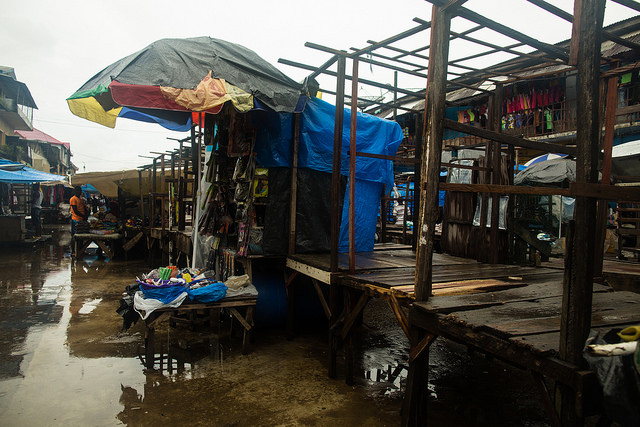The following post by IFPRI Director General Shenggen Fan was originally published on his DG Corner blog.
With deaths in the thousands and more cases reported each day, the Ebola epidemic has caused tremendous suffering, and will continue to do so for the foreseeable future. This is not just an immense health crisis—it also threatens agriculture and food and nutrition security in the severely affected countries (Guinea, Liberia, and Sierra Leone), and beyond. National governments and the international community must act swiftly to contain the disease and to prevent this public health emergency from becoming a food crisis.
Guinea, Liberia, and Sierra Leone were already experiencing food-security challenges before the Ebola outbreak. In Liberia in particular, about 30 percent of the population is undernourished—a statistic that has not changed since 1990. In all three countries, roughly 35 to 45 percent of preschool children are stunted as a result of being undernourished; these rates have also not changed much over the past 25 years.
Agricultural regions of Guinea, Liberia, and Sierra Leone have been hard hit by the Ebola epidemic. In Sierra Leone, the Ebola outbreak first emerged in Kailahun and Kenema—two of the country’s most productive agricultural areas for both the staple food (rice) and cash crops (cocoa and palm oil). According to initial reports by the World Bank, rice price increases ofup to 30 percent have been observed in areas affected by Ebola. In Liberia, cassava prices have increased by up to 150 percent, according to a rapid market assessment conducted by the Food and Agriculture Organization (FAO).
Why are food prices rising in these areas? In Kailahun, 40 percent of farmers have abandoned their farms for safer zones and 90 percent of plots there are uncultivated, according to FAO. For those that remain, quarantined zones and restrictions on movements have led to labor shortages during the harvest season for staple and cash crops. These factors lead to smaller harvests, which means less available food and higher prices.
Because Guinea, Liberia, and Sierra Leone are all net importers of food, measures to contain Ebola are also impacting food availability in rural regions due to rising transportation costs. In Liberia, a country that is heavily dependent on food imports, rice supplies to rural areas have been significantly reduced as the distribution of imported food from the capital to rural areas has been cut short.
These disruptions in production, labor markets, and trade/transportation have serious implications for the food security and nutrition of poor and vulnerable groups in these countries. Poor people spend a large proportion—about 50-70 percent—of their income on food, so rapid increases in the prices of staple foods harm them by reducing their purchasing power as well as their access to food and other essential goods and services.
Other responses to the Ebola epidemic could have long-term consequences on food and nutrition security. In Sierra Leone, school feeding programs have been shut down as all education institutions are closed, and restrictions on the consumption of bush meat, the suspected source of Ebola, have eliminated a traditional source of protein and nutrition from local diets.
Looking forward
While many actors in the international community are working to contain and eliminate the disease, they must also act urgently to prevent a threatening food and nutrition crisis in these countries. Here are my recommendations for how to move forward:
- Strategic food reserves will be important to address the developing food emergency caused by the Ebola epidemic. A properly operated strategic grain reserve can provide a key level of defense against food insecurity and undernutrition in times of emergencies. Such reserves can be managed by the World Food Programme, which already has a global food management system in place. Also, while necessary precautions must be taken, trade should remain as open as possible so that net buyers in food importing regions have better access to food.
- Social safety nets will be needed to protect those who are most affected by the Ebola epidemic. These safety nets, which could be in the form of cash or in-kind transfers (context-specificity is important here), should be accompanied with nutrition and health interventions. This is important, because investing in the nutrition and health of vulnerable populations could lower the mortality rate of diseases like Ebola, as nutritional status and infection are intricately linked. Social safety nets will also be crucial in the post-Ebola era to drive “reconstruction” efforts—not unlike after a conflict—to restart food production.
- Also critical are efforts to build in safeguards for the prevention and control of transboundary zoonotic diseases. The entire global community needs to do more to prevent future outbreaks of zoonotic diseases such as Ebola, SARS, and Avian Flu.
- There also need to be greater investments to build global health security through research and development, as well as public health infrastructure. Such investments must come from governments as well as the international community—enhancing the capacity of developing countries to prevent or contain an epidemic like Ebola is a collective effort. In our increasingly interconnected world, animal-borne diseases such as Ebola could travel far across borders.
The health impacts of Ebola are devastating. But without prompt action by national governments and the international community, Ebola can trigger a food crisis that may persist beyond the disease’s lifecycle. We must not allow this to happen.







